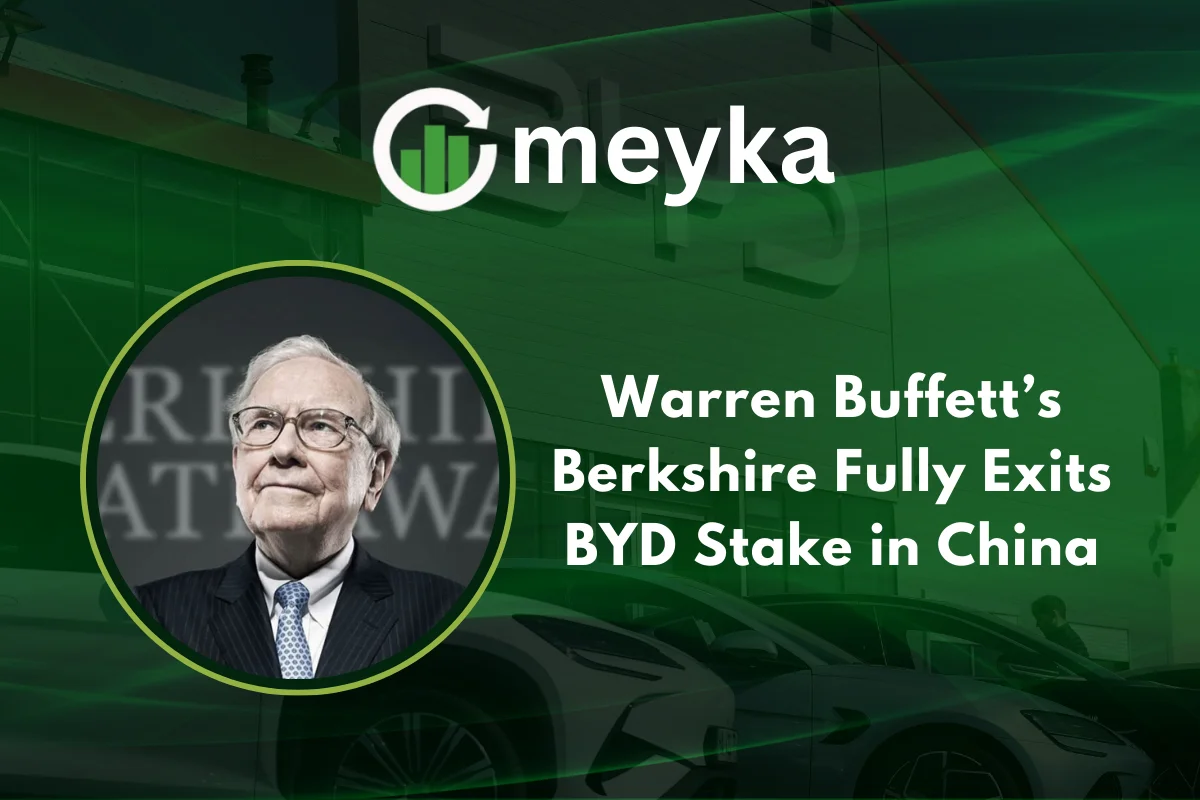Warren Buffett’s Berkshire Bids Farewell to BYD in China
The legendary investor Warren Buffett has closed a major chapter in his global portfolio. Berkshire Hathaway has fully divested its long-held stake in BYD Co Ltd, China’s electric vehicle and battery powerhouse. After nearly two decades of partnership, the investment giant has finally cashed out, ending a journey that generated remarkable returns and shaped the global EV narrative.
Berkshire’s Final Exit Explained
Berkshire Hathaway confirmed in a regulatory filing that its stake in BYD has fallen to zero. This comes after several years of trimming shares. The exit marks the end of an era that began in 2008, when Buffett purchased around 10% of BYD for just US$230 million.
Back then, BYD was an ambitious but relatively small EV and battery maker. Today, it stands among the world’s largest electric car manufacturers. Berkshire’s early bet not only paid off financially but also validated Buffett’s reputation for spotting undervalued opportunities.
Why Berkshire Walked Away
Extraordinary Gains Secured
The BYD investment has been one of Buffett’s most lucrative foreign ventures. By the peak, Berkshire’s stake had multiplied more than twenty times in value. Locking in profits after such a windfall reflects Buffett’s disciplined approach to investing, knowing when to enter, but also when to leave.
Market Challenges for BYD
Despite its growth, BYD is navigating headwinds. Domestic demand for EVs in China has been slowing. Profit margins are under pressure, with price wars and heavy competition squeezing earnings. This environment may have influenced Buffett’s timing.
Risk Diversification
China’s shifting regulatory climate and increasing geopolitical tensions add extra uncertainty. By exiting, Berkshire reduces exposure to these external risks while reallocating capital into other global opportunities, possibly in AI stocks, renewable energy, or U.S. markets.
The Bigger Picture for Warren Buffett
This decision reflects how Warren Buffett continuously reshapes Berkshire’s portfolio. The BYD sale does not indicate a loss of faith in the EV industry; it highlights the principle of capital discipline.
- Portfolio Rotation: Berkshire can now shift billions of dollars into newer sectors where growth looks more sustainable.
- Risk Management: Reducing reliance on Chinese markets protects against sudden regulatory or economic shocks.
- Reputation Strengthened: Generating one of the largest returns in Berkshire’s foreign history cements Buffett’s global legacy.
Investor Takeaways from the BYD Exit
Patience Brings Rewards
Holding a stake for 17 years and exiting only after significant appreciation shows the importance of a long-term outlook.
Exits Are as Important as Entries
Buffett’s gradual sell-off from 2022 to 2025 signals that profit realization is a critical part of investing. Investors should track when seasoned experts trim their positions.
Sector Volatility Matters
The EV space is booming, but also unstable. Investors need to factor in competition, slim margins, and government policies before committing capital.
Impact on the Stock Market
- BYD’s Stock Response
News of Buffett’s complete exit rattled markets. Shares dipped as investors interpreted it as a cautious signal about the company’s outlook. - EV Industry Watch
Competitors such as Tesla, NIO, and XPeng are also under pressure. BYD’s challenges highlight broader concerns about overcapacity and slowing demand. - Global Capital Shifts
When Warren Buffett makes a move, Wall Street and international investors pay attention. His exit may encourage more funds to review their exposure to Chinese equities and instead look at AI stocks or other growth sectors in different markets.
What Lies Ahead for BYD
While Buffett has exited, BYD’s story is far from over. The company continues to invest heavily in global expansion, advanced battery production, and partnerships in Europe and Southeast Asia.
The absence of Berkshire as a long-term shareholder may increase volatility, but BYD’s fundamentals, such as innovation in EV batteries and strong brand presence in China, remain intact. For investors willing to take on more risk, BYD could still be attractive, but the easy gains of the past may no longer be on the table.
Conclusion
The complete sale of BYD shares marks the end of a 17-year investment journey for Warren Buffett. The move reflects a classic Berkshire strategy: identify value early, hold through growth, and exit when the risks outweigh the rewards. For global investors, this serves as a reminder that even the strongest companies face cycles of growth and challenge.
Buffett’s departure does not end BYD’s rise, but it does shift the conversation toward where Berkshire Hathaway will invest next, and how markets should prepare for changing tides in the EV and tech industries.
FAQs
No. The exit from BYD is about securing profits and reducing exposure to China, not about rejecting EVs as a whole. Buffett has always supported renewable energy and innovative technology.
While exact numbers vary, analysts estimate Berkshire made a return of more than 20 times its original investment, making BYD one of Buffett’s most successful bets abroad.
Investors should note the value of patience, the importance of exiting at the right time, and the need to diversify away from markets facing higher risks.
Disclaimer:
This content is made for learning only. It is not meant to give financial advice. Always check the facts yourself. Financial decisions need detailed research.






